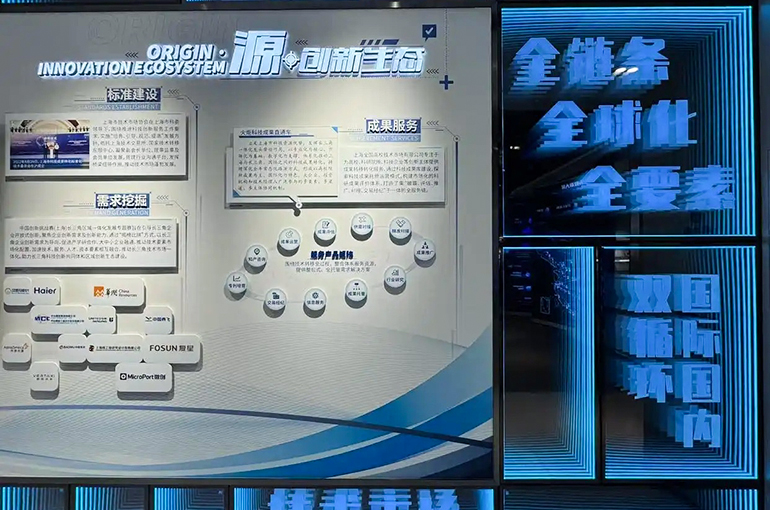 Shanghai's Tech Services Sector Made Up 5.6% of City's GDP in 2024
Shanghai's Tech Services Sector Made Up 5.6% of City's GDP in 2024(Yicai) April 9 -- Shanghai's technological service industry grew significantly last year, accounting for 5.6 percent of the city's gross domestic product and driving its economic growth rate by 0.4 percentage point.
The value of Shanghai's technological service sector jumped 8.8 percent to CNY300 billion (USD40.9 billion) in the 12 months ended Dec. 31 from the previous year, according to official figures.
Behind the growth is Shanghai's strategic layout of continuously building a whole-chain innovation ecosystem system of incubation and cultivation, achievement transformation, and industrial application.
Professional Incubators Become Engines of Innovation
Zhangjiang Hi-Tech Park's 895 Entrepreneurship Camp, a symbolic leader of the technological service industry, has developed for over nine years and cultivated 437 science and technology innovation firms, with 20 receiving direct investment and five going public.
The platform has created a unique "industrial special session + professional service" model, focusing on sub-fields such as integrated circuit packaging and testing. It has co-built a 24-hour chip-testing public service platform with Hualing and set up an angel fund of nearly CNY200 million (USD27.3 million) to support hard technology startup projects.
"We are promoting the deep incubation plan and laying out high-quality incubators in key areas such as Zhangjiang and the 'Great Zero Bay,'" said Zhai Jinguo, deputy director of Shanghai's Science and Technology Commission. The city has set up 12 professional incubation platforms, with entrusted development, inspection, testing, and other services accounting for more than 50 percent of the revenue, Zhai added.
The transaction volume of technology contracts in Shanghai rose 7.2 percent to CNY520 billion in 2023 from the year before, according to official data.
Transformation of Sci-Tech Achievements Enters Fast Track
Shanghai's pilot reform of empowerment has achieved remarkable results in transforming university achievements, with 39 participating institutions completing the empowerment of 215 achievements. The amount received via tech transfers, licensing deals, equity investments, and other such methods has exceeded CNY1.1 billion (USD149.9 million), driving the establishment of 153 sci-tech firms and attracting investment of over CNY6.8 billion.
East China Normal University hiked its transformation amount to CNY476 million from CNY7.1 million (USD64.9 million from USD967,395) in 2023 from the previous year through licensing and transfer. In addition, the University of Shanghai for Science and Technology's humanoid robot project bagged hundreds of millions of yuan within two months.
"The empowerment reform has loosened the institutional constraints on the transformation of sci-tech achievements," noted Zou Shujun, executive president of the National Eastern Tech-Transfer Center. The center and five universities have jointly offered degree courses in technology transfer, Zou said.
In addition, the National Eastern Tech-Transfer Center is preparing to set up China's first technology manager firm to cultivate professional "sci-tech matchmakers" to solve the problem of connecting production, education, and research, Zou pointed out.
Under the catalysis of policy dividends, innovative firms in sub-fields are growing rapidly. Qianhetai Technology, which focuses on auto thermal management, has landed orders for its compressor tech innovation from 12 carmakers. Its revenue exceeded CNY50 million last year, while it bagged orders worth over CNY20 million in the first quarter of this year.
"More than CNY4 million of government support funds have enabled us to gain a firm foothold in the new energy vehicle thermal management track," said Ma Hao, founder of Qianhetai Technology.
With the accelerated layout of incubators in frontier areas, including synthetic biology and quantum technology, Shanghai is focusing on creating a gradient cultivation system of sci-tech small and medium-sized, high-tech, and leading sci-tech enterprises. The city is on the fast track of the technological service industry.
To consolidate the development advantages of the technological service sector, Shanghai recently launched 31 measures, including research and development support, application scenario opening, and financing relief.
Editor: Martin Kadiev